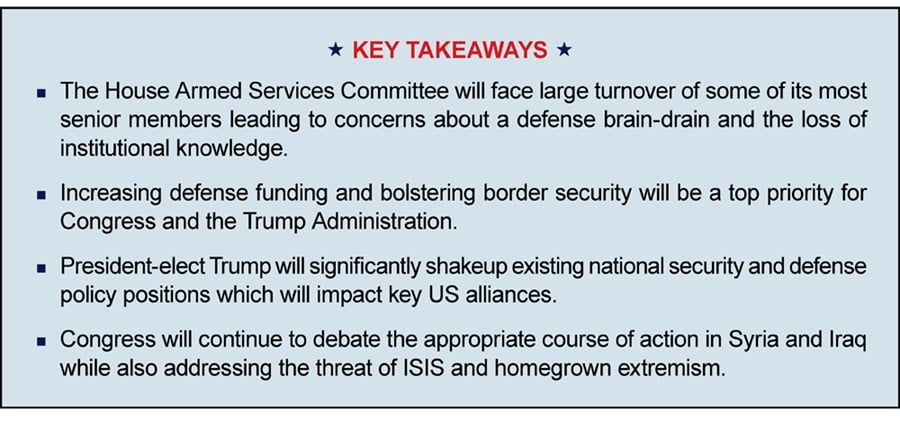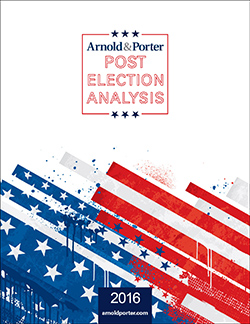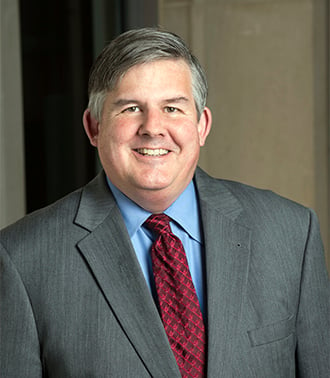Post-Election Analysis 2016: National Security & Defense

Transition Team for National Security
- J.D. Gordon – retired Navy Commander
National Security Advisors
- George Papadopoulos – formerly at the Hudson Institute
- Joseph Keith Kellogg – retired Army Lieutenant General and Vice President of CACI International
- Joseph Schmitz – former Inspector General of the Department of Defense
- Walid Phares – former foreign policy campaign advisor to Gov. Mitt Romney and Fox News Commentator on Terrorism and Middle Eastern Affairs
ADMINISTRATION PRIORITIES
President-elect Trump's national security policy agenda will shake up existing US foreign policy and national security frameworks. Most notably, we expect a more skeptical view toward US alliances with both the North Atlantic Treaty Organization (NATO), and Asian allies such as South Korea and Japan.
Iran and Other Foreign Policy Issues. President-elect Trump opposed the nuclear agreement with Iran, and has suggested that he will seek to re-negotiate the deal or reject the deal altogether. Therefore, he may not continue some of the Iran sanctions relief that the US granted after Iran met its initial commitments under the nuclear deal, which was effectuated through executive orders that can be changed by the new President. President-elect Trump also has promised to "reverse" President Obama's loosening of the Cuba sanctions. While he will continue the fight against the Islamic State of Iraq and Syria (ISIS), we expect that he will end any effort to support those seeking to force regime change in Syria. We also expect a much more pro-Russia foreign policy in Europe on such issues as Ukraine. The Baltic NATO members (Estonia, Latvia, and Lithuania) already have expressed concern that President-Elect Trump will not defend them against Russian aggression.
Defense. President-elect Trump supports a strong military, and we expect a significant increase in the defense budget. President-elect Trump has called for increasing defense spending by $450 billion over a decade, including escalating spending on defense procurement, modernizing missile defense systems and Navy cruiser ships, and increasing military troop levels. One area where government contractors may see additional growth opportunities under the Trump Administration is support for offensive cyber operations. During the campaign, President-elect Trump placed an emphasis on the offensive (as opposed to defensive) use of US capabilities in cyberspace, saying that "[t]he United States must possess the unquestioned capacity to launch crippling cyber counter-attacks. This is the warfare of the future." He has also expressed a desire to see wholesale changes in the General officer ranks, and will likely make significant and unprecedented changes to the Joint Chiefs of Staff and the Combatant Commands.
Counterterrorism. President-elect Trump will make significant changes to counterterrorism policies. In particular, he will use his executive authority over the Department of Homeland Security to significantly reduce, if not eliminate, travel by foreign visitors from countries thought to be home to terrorists. He has also indicated that he would reinstate waterboarding as a permissible interrogation practice, despite resistance from officials of the agencies that would be affected by that policy change.
AGENCY LEADERSHIP
The open question for President-elect Trump is whether seasoned Republican national security experts, many of whom opposed him in the election, would be willing to accept a position in the Trump Administration. Possible appointees include:
- Sen. Jeff Sessions (R-AL), an early supporter of President-elect Trump, who would be a candidate for Secretary of Defense.
- Sen. Bob Corker (R-TN), Chairman of the Senate Foreign Relations Committee, has several staffers on the transition team, and is a serious candidate for Secretary of State.
- Gov. Chris Christie is a leading candidate for Attorney General or Secretary of Homeland Security.
- Lt. General Michael Flynn, former Director of the Defense Intelligence Agency, is a candidate for Director of the Central Intelligence Agency (CIA) or Secretary of Defense.
- Rudy Giuliani, former Mayor of New York, is likely to be offered a national security position, such as Attorney General or Secretary of Homeland Security
- Newt Gingrich, former Speaker of the House, is a candidate for Secretary of State.
- Stephen Hadley, former National Security Advisor to President George W. Bush, was one of the few prominent Republican foreign policy experts to remain silent during the election. He could return to the position of National Security Advisor or accept a position in the Department of State or Department of Defense.
CONGRESSIONAL LEADERSHIP
House. Rep. Mac Thornberry (R-TX), chair of the House Armed Services Committee (HASC), is expected to remain in his role, as is HASC Ranking Member Rep. Adam Smith (D-WA). At least eight seats on the HASC will be vacant because members ran for other office or have announced their retirement. Three of these members hold subcommittee leadership positions, including Rep. Randy Forbes (R-VA), who was defeated in his primary and chaired the Subcommittee on Seapower and Projection Forces in the 114th Congress. There are also two members who are running for the Senate: Rep. Joe Heck (R-NV), who will vacate his position as chair of the Subcommittee on Personnel and give up his position on the House Permanent Select Committee on Intelligence (HPSCI); and Rep. Loretta Sanchez (D-CA) who serves as ranking member of the Subcommittee of Tactical Air and Land Forces and is second in seniority on the House Homeland Security Committee. Other notable vacancies include Rep. Jeff Miller (R-FL), a senior member of the HASC and second in seniority on HPSCI, who announced his retirement earlier this year.
Rep. Hal Rogers (R-KY), who is term limited from remaining as the full chairman of the House Appropriations Committee, is expected to move to become chair of the Subcommittee on Defense after announcing his candidacy earlier this fall. He is favored for the position, but will compete against the Subcommittee on Defense Vice-Chair, Rep. Kay Granger (R-TX), who will otherwise continue to chair the Subcommittee on State, Foreign Operations and Related Programs. The current Subcommittee on Defense Chair, Rep. Rodney Frelinghuysen (R-NJ), is vying for the top spot as full Appropriations Committee chair and is favored to take the gavel. The current ranking member of the Subcommittee on Defense, Rep. Pete Visclosky (D-IN) is expected to hold his position. Two senior retiring members will be departing the Subcommittee on Defense.
The House Homeland Security Committee leadership is expected to remain unchanged with current Chair Michael McCaul (R-TX) and Ranking Member Bennie Thompson (D-MS), who has served as the committee's top Democrat since 2006. The leadership of HPSCI also is expected to remain unchanged in the 115th Congress with Rep. Devin Nunes (R-CA) and Rep. Adam Schiff (D-CA) staying on as chair and ranking member, respectively.
Senate. Sen. John McCain (R-AZ) is expected to remain as chair of the Senate Armed Services Committee (SASC) and Sen. Jack Reed (D-RI) will remain as ranking member of the full committee.
Sen. Thad Cochran (R-MS) who is expected to remain serving as chair of the Senate Appropriations Committee, is also expected to stay on as chair of the Subcommittee on Defense. Sen. Dick Durbin (D-IL) is expected to remain as ranking member of the subcommittee.
Sen. Ron Johnson (R-WI) is likely to continue to chair the Senate Homeland Security and Governmental Affairs Committee (HSGAC) Sen. Tom Carper (D-DE) may remain as the ranking member, but he may seek to serve as ranking member on the Senate Environment and Public Works Committee. In that event, Sen. Claire McCaskill (D-MO) may seek the ranking member position on HSGAC. Sen. Richard Burr (R-NC) will remain as chair of the Senate Select Committee on Intelligence (SSCI) and Sen. Dianne Feinstein (D-CA) will remain as ranking member.
CONGRESSIONAL PRIORITIES
With Republicans in the White House and controlling both chambers of Congress, we expect to see a shift in favor of increased defense spending, although some of President-elect Trump's defense and national security policies will draw opposition from members of his party. Additionally, Republican leaders who withdrew support from President-elect Trump late in the campaign are likely to face challenging working relationships with the new administration. For instance, Senate Armed Services Committee Chairman John McCain, a respected voice on national security and defense issues, has spoken out against President-elect Trump's policies on how he would address the threat of terrorism, his comments on abandoning NATO partners, and comments regarding torture and bringing back interrogation techniques such as waterboarding. While President-elect Trump has walked back his comments on banning all Muslims from entering the US, some of the Republican leaders have called such efforts unconstitutional and impossible to implement.
National Defense Authorization Act (NDAA). One of the key decisions Congress will consider is funding for conflicts in Afghanistan, Syria, and Iraq. With President-elect Trump's proposal to drastically increase defense spending, Congress will likely increase funding levels in the FY 2018 NDAA. The chairs of the Armed Services committees are likely to continue their focus on the implementation of the sweeping defense acquisition system reforms and modernization of the military health system initiated in the FY 2017 NDA A bill, and to seek additional funds to support local forces fighting against ISIS. Efforts to combat the nuclear modernization and military modernization efforts will also be among HASC Chair Mac Thornberry's priorities.
Combating ISIS and Terrorism. The deadly ISIS-inspired attacks in San Bernardino and Paris renewed the debate in Congress over how to address the growing threat of ISIS and homegrown terrorism, prompting Republicans to push for further restrictions on Syrian refugees resettlement in the US. Under President-elect Trump's Administration, Republicans are likely to enact enhanced vetting processes and tightened visa security standards for those seeking asylum and placing stronger restrictions on entry into the US from war-torn countries like Syria and Iraq, as proposed in the 114th Congress. However, even congressional Republicans will be resistant to President-elect Trump's efforts to place a ban on Muslims entering the country, a campaign promise that received resistance from House Republican leadership, including House Speaker Paul Ryan (R-WI) and House Homeland Security Committee Chair McCaul, who raised concerns over banning people from an entire religion from entering the country. Rep. McCaul is also likely to advance policies focusing on combating ISIS propaganda through social media and developing counter-narratives through the Departments of Homeland Security and State.
Nuclear Proliferation and Relations with North Korea and Russia. Rep. Thornberry has focused on nuclear deterrence during his tenure as HASC chair and has been deeply concerned about North Korea and Russia's capabilities. House Foreign Affairs Committee Chair Ed Royce (R-CA) has said the new administration must work with China to pressure North Korea over North Korean leader Kim Jong-un's bold actions to promote the country's nuclear ambition. It is difficult to predict how President-elect Trump will approach the issue with North Korea, given his conflicting statements during the campaign, including suggesting he would negotiate a deal with North Korean Supreme Leader Kim Jong-un, while also calling for China to solve the problem for the US. Republicans will likely introduce and pass sanctions bills and continue advocating for raising economic pressure on North Korea and China.
Given President-elect Trump's suggestions that the US should withdraw from strategic alliances like NATO, and that countries such as Japan and South Korea should arm themselves, Republicans may support efforts to push NATO partners to pay more of their fair share, but will resist abandoning important allies. Republican leadership, including Senate Majority Leader Mitch McConnell (R-KY), distanced themselves from President-elect Trump's statements that he would not automatically defend NATO allies in Eastern Europe if they are threatened by Russia. Additionally, questions regarding the direction of the US's relationship with Russia will be a significant concern among not only congressional Democrats but also top Republican leaders, given President-elect Trump's affinity for Russian President Vladimir Putin.
Encryption and Cybersecurity. Following the hacking of the Office of Personnel Management, Congress has called for proportional responses to hacking by state actors such as China and Russia. Republicans will seek to allocate more resources for the military, intelligence community, and law enforcement to combat cybercrime. Cybersecurity will remain an important focus for the 115th Congress, as members attempt to address a new frontier in data breaches and cyber threats.
Following the public battle between the Federal Bureau of Investigation (FBI) and Apple, over the San Bernardino terrorist's encrypted iPhone data, Congress recognized the need to update current laws to ensure that law enforcement and the intelligence community are able to address potential threats and access smartphones to aid their investigations. President-elect Trump, who called for a boycott of Apple over the incident, has sided with security and law enforcement advocates, and some Republicans have called for legally creating backdoors for law enforcement to circumvent encryption. House Homeland Security Chair Michael McCaul and Senate Intelligence Committee leaders, Sen. Richard Burr and Sen. Dianne Feinstein, introduced bills addressing encrypted data in the 114th Congress, and will re-introduce some of these measures in the 115th Congress. But any such legislation will face heavy scrutiny from the tech industry and privacy advocates, and opposition from many congressional Democrats. In the 115th Congress, a bipartisan working group, created by the House Judiciary and Energy and Commerce Committees, will continue its work to develop policy recommendations on encryption to prevent exploitation of it by bad actors.
Despite President-elect Trump's comments on restoring provisions of the Patriot Act that allow for bulk data collection, it is unlikely Congress will be willing to reopen that debate, given the continuing divide between defense hawks who have been proponents of restoring the program and more libertarian members of the Republican caucus.
Our full analysis of the 2016 election is available below.




